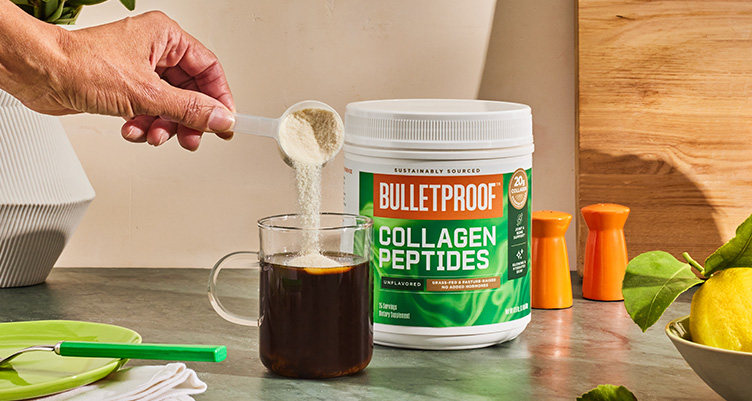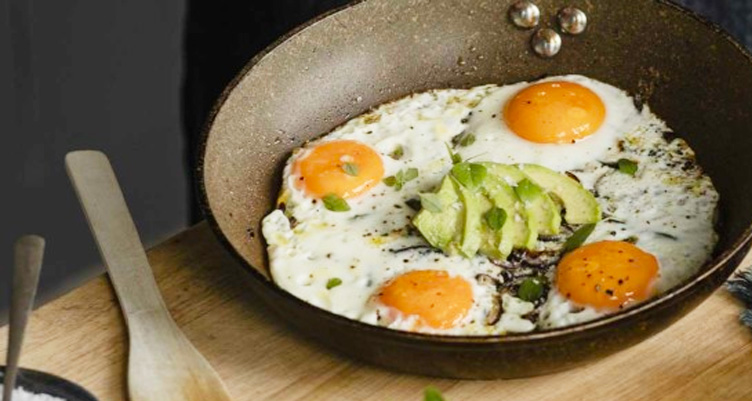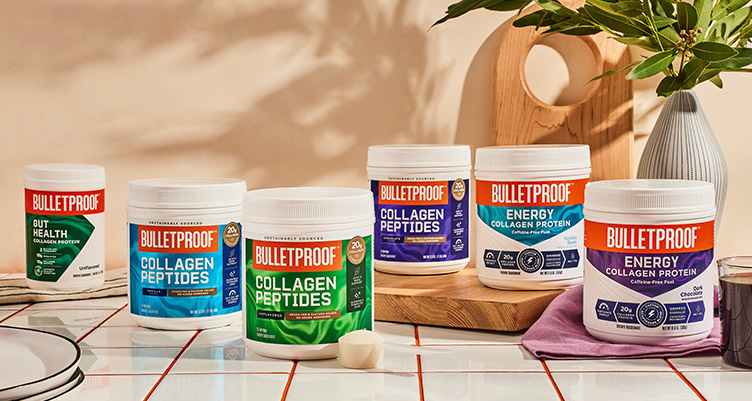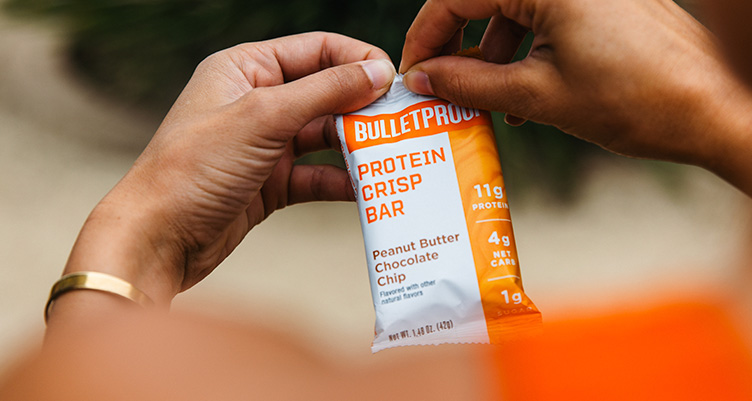How To Find Your Ideal Protein Intake

- Protein is a macronutrient that is crucial for cell growth and repair.
- Not all sources of protein are the same. Complete proteins provide all essential amino acids. Amino acids give your body the building blocks for protein, tissue repair and even the production of hormones and neurotransmitters.
- The amount of protein you need depends on your lifestyle, age, health goals and muscle mass.
All the praise protein receives is for good reason. Protein is one of the OG macronutrients. (Carbohydrates and fats are the other two.) It grows and repairs muscle (#gains), keeps your metabolism humming and curbs your appetite.[1]
But amongst all this talk, this thought has likely crossed your mind: “How much protein do I need?” Turns out, there’s no one-size-fits-all prescription for how much protein everyone should be eating. Both the type and amount of protein you eat depend on a bunch of different factors, from your age to your muscle mass to your lifestyle.
Keep reading to find your ideal protein intake to build muscle, burn fat and maintain a healthy weight. You’ll also learn about the best protein foods and high-protein recipes.
WHAT IS THE BEST PROTEIN FOR YOUR BODY?

If you’re looking to improve your health, protein is an important topic in conversation. But which protein is best? Let’s start with the basics of protein.
Protein is made up of building blocks called amino acids. There are 20 different amino acids, and nine of them are essential.[2] When nutrients are designated as “essential,” it means your body doesn’t make them, so you must get them from food.
In general, you want complete proteins, which are proteins with all nine essential amino acids.[3]
From breakfast to dinner and the snacks in-between, these high-protein foods contain all nine essential amino acids. They also have beneficial vitamins and nutrients that support your entire body:
- Grass-fed beef and lamb
- Pasture-raised pork
- Wild-caught fish (Alaskan salmon pairs protein with a big dose of omega-3 fatty acids)
- Pasture-raised eggs
- Grass-fed whey protein
- Bulletproof Energy Collagen Protein
If you prefer high protein low carb foods and don’t eat meat, we’ve got you covered. Check out our list of protein sources for vegetarian keto dieters. Vegetarians can also nosh on plant sources like quinoa, buckwheat and hempseed for complete protein sources.
Vegetables, nuts, legumes and whole grains may contain protein, but they’re not always complete dietary protein sources. In other words, they don’t always have all nine essential amino acids.
Can you eat too much protein?

The famous Popeye might say there’s no such thing as too much protein, but that’s not true. Going overboard with protein intake (even on nourishing whole foods) may do more harm than good.
Problems that may arise include:
Kidney Issues
The kidneys filter protein waste products, so long-term protein overload could contribute to kidney disease. Some research shows that high-protein diets may affect those with kidney damage by causing kidney hyperfiltration, kidney stones and glomerular injury.[4]
Increased risk of heart disease
High protein diets are often used for weight loss. However, research has found that a high protein intake may also increase the risk of heart disease. Researchers attribute this in part to the intake of saturated fat and cholesterol.[5] This is where plant sources of protein come in handy, as they may not cause the same risks.
The Bulletproof perspective is that not all saturated fat and cholesterol are the villains we’ve been led to believe. Protein quality matters. Odds are, you’ll face far more damaging effects from fast food than from grass-fed, pasture-raised proteins. Check out what you should know about saturated fat.
HOW MUCH PROTEIN DO I NEED?

The recommended dietary allowance (RDA) for protein consumption is 0.8 grams per kilogram of body weight.[6] A good starting point is about 0.4 grams of protein for every pound. A 120-pound woman, for example, would eat 48 grams of protein a day (120 x 0.4 = 48) as part of her total calories. Notice that this is far less protein than many diets recommend.
If you’re healthy and sedentary, this is the least amount for maintenance. At this level, it’s unlikely you’ll gain muscle, but the good news is that you’re not as likely to lose previous gains, either.
HOW MUCH PROTEIN SHOULD I EAT TO GAIN MUSCLE?
Rebuilding torn muscles takes a lot of amino acids — about 0.8 grams of protein per pound bodyweight if you work out regularly.
But what about all those studies showing that you get crazy gains from several hundred grams of protein a day? Or the athletes and bodybuilders in the gym who swear by protein-loaded shakes and bars?
Unbiased research shows that 0.8 grams per pound of bodyweight is plenty of protein to build muscle. Athletes and bodybuilders should aim for 0.82 grams per pound for more muscle mass.
HOW MUCH PROTEIN SHOULD I EAT TO LOSE WEIGHT?
If your end goal is weight loss, you’re in luck. Protein is more satiating than fat or carbohydrates and increases thermogenesis. Translation: you’ll burn more body fat if you eat higher protein.[7]
Studies suggest keeping protein between 20% to 30% of your daily calories will help you burn fat.[8] A good rule of thumb to get in that range is about 1 gram of protein for every pound you weigh.
HOW DOES PROTEIN SUPPORT RECOVERY?
When you’re injured, your body uses extra protein to rebuild damaged tissue. The branch chain amino acids valine, leucine and isoleucine speed up wound recovery and support joint, bone and tissue damage.[9]
Bulletproof Collagen Peptides have all three. For extra nourishment when you need it most, shoot for a total of 1 gram of protein per pound of bodyweight each day. Hydrolyzed collagen protein can help to provide some of that protein.
DOES COLLAGEN INCREASE PROTEIN INTAKE?

On its own, collagen peptides powder is not a complete protein. It’s missing tryptophan — one essential amino acid that would make it complete.
That doesn’t mean you should kick collagen to the curb, though. It’s especially high in glycine, proline and hydroxyproline, the three main amino acids that your body uses to make connective tissue.
That’s a big deal if you want to support recovery after physical activity, and an even bigger deal if you want to support hydrated skin.[10][11]
Bulletproof Collagen Peptides provide your body with the amino acid building blocks for:
- Smoother, more elastic skin
- Strong bones
- More resilient joints and ligament
Bulletproof’s Energy Collagen Protein is a different kind of protein supplement. It contains the eight amino acids found in collagen, plus added tryptophan, which gives it a complete amino acid profile.
Even better? You get a custom energy blend of nutrients and MCT oil to support energy. Talk about a new way to shake up your protein shake.
HOW TO INCREASE PROTEIN INTAKE

Looking for ideas to bump up your protein intake? You don’t have to go whole-hog and eat your weight in chicken breasts at every meal. You can add protein throughout the day with ideas for everything from breakfast to snacks to dessert.
Give these ideas a try:
- Have a protein shake for breakfast:: This is a fast, convenient and delicious way to increase your protein intake early in the day. Blend up this Berry Matcha Smoothie, featuring Vanilla Bean Energy Collagen Protein and get 10.7 grams of protein per serving.
- Eat the protein on your plate first:Those starchy potatoes may be calling your name, but protein has some incredible benefits for satisfying hunger. Protein reduces the hunger hormone ghrelin and boosts peptide YY, a hormone that’s responsible for helping you feel full.[12]
- Add collagen to your morning coffee:Add Bulletproof Collagen Peptides to your morning coffee. Two scoops give you 20 grams of collagen!
- Enjoy a high-protein snack:This could be Greek yogurt and berries, turkey sticks and cottage cheese or hard-boiled eggs. For protein on-the-go, snack on a Bulletproof Protein Crisp Bar for 11 grams of protein (and four craveable flavors).
- Try a high-protein recipe:Tuck into a bowl of No-Bean Keto Chili, which packs 24 grams of protein per bowl (and makes great leftovers).
- Indulge in high-protein desserts: Treat yourself to a No-Bake Protein Brownie Bite with 6 grams of protein per bite.
Proteins are the building blocks of life, so making sure you hit your required amount is important for your health and wellness. Think of this guide as a starting point for daily protein intake.
At the end of the day, you must consider your own biology and lifestyle when determining your individual protein needs. Age, diet and activity level all factor into your personal protein requirements. We always recommend maintaining an open dialogue with a doctor and/or registered dietitian. This is especially important when you’re changing your diet.
Sign up for early access to sales, product launches, the latest Bulletproof news and more!
This article has been updated with new content.



